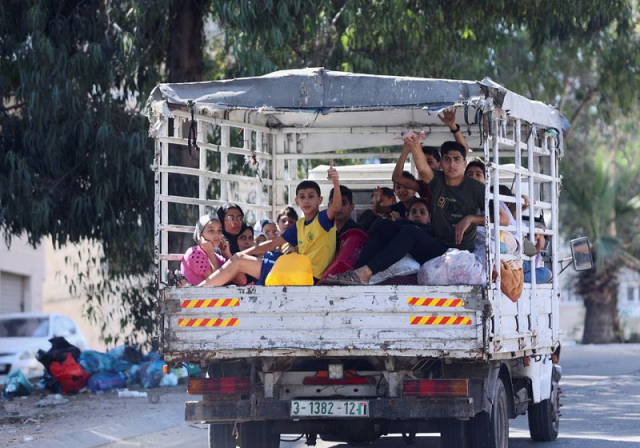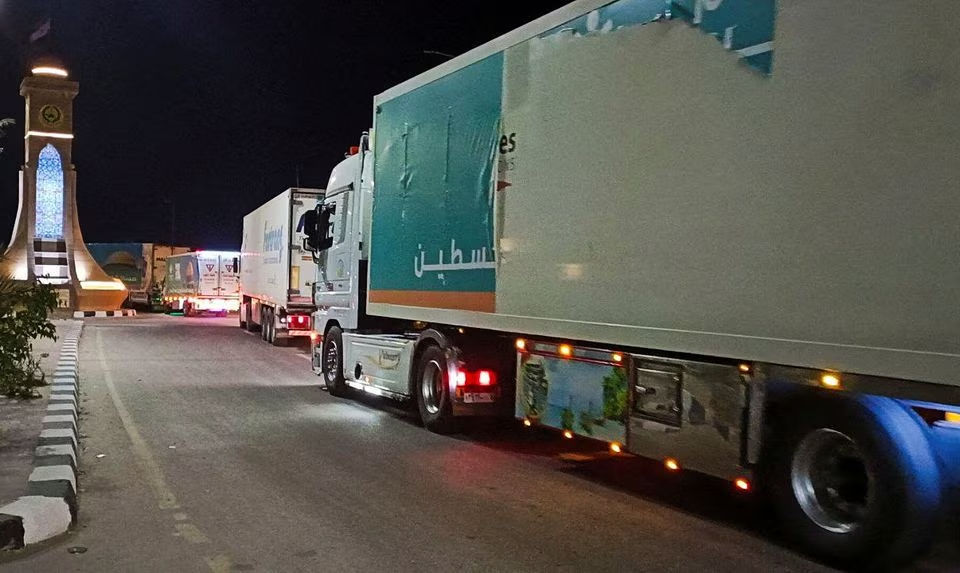Israel's Gaza evacuation order could breach international law – UN
UN warns Israel's Gaza siege may violate international law, urges humanitarian aid access

The United Nations human rights office said on Tuesday that Israel's siege of Gaza and its evacuation order for the north of the enclave could amount to a forcible transfer of civilians and be in breach of international law.
Speaking to reporters in Geneva, Ravina Shamdasani, spokesperson for the UN human rights office, said Israel seemed to have made no effort to ensure the civilians temporarily evacuated in Gaza were provided with proper accommodation, as well as satisfactory conditions of hygiene, health, safety and nutrition.
"We are concerned that this order, combined with the imposition of a complete siege of Gaza, may not be considered as lawful temporary evacuation and would therefore amount to a forcible transfer of civilians in breach of international law," she said.
"Those who managed to comply with the Israeli authorities' order to evacuate are now trapped in the south of the Gaza Strip, with scant shelter, fast-depleting food supplies, little or no access to clean water, sanitation, medicine and other basic needs."
Read also: Israel calls on at least 1.1m Gazans to leave city within 24 hours
The term "forcible transfer" describes the forced relocation of civilian populations and it is a crime against humanity punishable by the International Criminal Court (ICC).
In separate comments, the World Food Programme said its food supplies in Gaza were running low but that it was stockpiling supplies in the Egyptian city of Al-Arish nearby.
Abeer Etefa, WFP Regional Communications Lead for the Middle East and North Africa, said they hoped "to cross as soon as the border access is granted."
"We call for unimpeded access, safe passage to desperately needed humanitarian supplies to Gaza," she said.
Gaza aid arrives at border crossing but no plan for delivery yet
Egyptian aid trucks moved closer on Tuesday to the only crossing to Gaza not controlled by Israel, but with no agreement in place to deliver relief and the Palestinian side still closed due to strikes it was unclear when they might pass through.

A convoy of trucks carrying humanitarian aid from Egyptian NGOs for Palestinians start to move from Al-Arish to Rafah city as they wait for an agreement on the opening on the Rafah border crossing to enter Gaza, amid the ongoing conflict between Israel and Hamas, in the city of Al-Arish, Sinai peninsula, Egypt, October 17, 2023. PHOTO: REUTERS
At least 49 people were killed in overnight Israeli bombardment of Rafah, where the crossing is located, and the nearby town of Khan Younis, Gaza's interior ministry said.
Some people with dual citizenship who have gathered in recent days awaiting the opening of the Rafah crossing began approaching the border on Tuesday, but many said they were staying away due to the air strikes.
After nine hours of negotiations, US Secretary of State Antony Blinken said early on Tuesday he had agreed with Israel "to develop a plan" to get aid into Gaza.
Egypt says the Rafah crossing, a vital artery before the fighting and now a key route for desperately needed supplies into the Israeli-besieged Palestinian enclave, has not been officially closed but has become inoperable due to the Israeli air strikes on the Gaza side.
Early on Tuesday some 160 trucks left al-Arish in Egypt's Sinai peninsula, where hundreds of tonnes of aid have been awaiting an agreement on aid delivery, an eyewitness told Reuters.
Ahmed Salem of the Sinai Foundation said that the trucks heading for the border contained Egyptian aid, and that the international aid remained in warehouses in al-Arish.
Read: Gaza aid stuck as Egypt says Israel not cooperating
Salem and another security source said Egypt had repaired the roads within the crossing that had been damaged by Israeli strikes.
Israel began its intense bombardment and siege of Gaza following a devastating assault by Hamas fighters on Oct. 7.
The territory's 2.3 million residents have been left without power, pushing health and water services to the brink of collapse, with fuel for hospital generators running low. Hundreds of thousands of people have been displaced.
"Gaza's medical infrastructure has been irreparably damaged and healthcare providers are working in a dire situation with limited access to medical supplies and conditions that do not allow them to provide timely and quality healthcare," said UN Special Rapporteur Tlaleng Mofokeng, who focuses on the right to health.
Fuel reserves at all hospitals across Gaza are expected to last for an additional 24 hours only, according to the UN Palestinian agency UNRWA.
"The shutdown of backup generators would place the lives of thousands of patients at serious risk," it said.
A UN spokesperson said on Monday that no progress had been made on the Rafah opening, and that fighting on roads key to the aid delivery made it difficult to operate.
Negotiations
Blinken lobbied hard for a plan as leaders of the half dozen Arab states that the top US diplomat toured in recent days had all conveyed that getting aid into Gaza should be a top priority, a senior US official said.
Blinken said both the US and Israel were concerned that Hamas would seize or destroy the aid. This concern, along with fears that aid would be used as cover for weapons, had hindered a planned delivery on Monday, two Egyptian security sources said.
Also read: Blinken says meeting with Saudi Crown Prince was 'very productive'
An understanding was reached that the aid would be delivered to specific secure locations in Gaza under monitoring, the security sources said, in exchange for limited evacuations of foreign passport holders, though there were Palestinian fears that that could result in de facto forced displacement.
A senior US official said such a plan had not yet been agreed.
The official said Biden's newly appointed envoy for humanitarian affairs in the Middle East, David Satterfield was going to meet with the Israelis on Tuesday and start hammering out the details of the plan.



















COMMENTS
Comments are moderated and generally will be posted if they are on-topic and not abusive.
For more information, please see our Comments FAQ